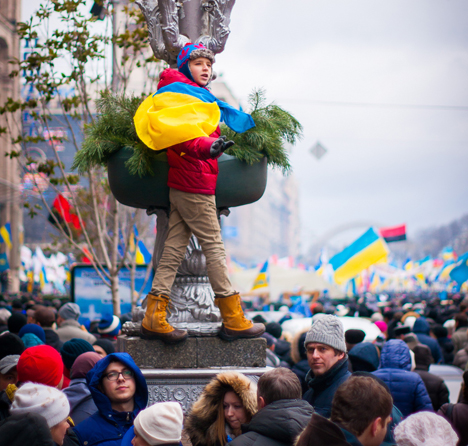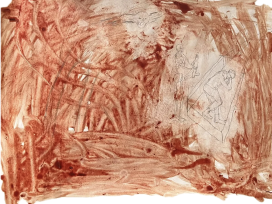
For those who suffered the consequences of Yalta’s division of Europe, the Helsinki Final Act brought grounds for optimism. Today, as Russia’s regressive war on Ukraine reopens old conflicts, it stands as a monument to European modernity.
Ukraine was ranked 107th out of 180 countries in this year’s World Press Freedom Index. An improvement on 2015, but still indicative of the serious threats that the country’s journalists face. Cecilia Ferrara takes stock of recent developments in the new media landscape.
One of the reasons for Ukraine rising 22 places in the 2016 World Press Freedom Index, compiled by Reporters Without Borders, is certainly to be found in the so-called Euromaidan Revolution, which led to the country’s pro-Russian premier Viktor Yanukovic fleeing the country in February 2014. Yet even before the pro-Russian change of direction on the part of Yanukovic, a more open approach to the media had already been seen in Ukraine with a view to becoming closer to the European Union. Political interference had been reined in, and new groups and independent media sprung up, many of them run on a voluntary basis. When Yanukovic announced that the country would withdraw from negotiations on the Association Agreement for free trade between Ukraine and European member states – coinciding with a sudden about-turn in favour of Moscow – the protests began, and journalists were key players in it, along with the internet and social media.

One of the most notable examples of new media that developed around Maidan is Hromadske Radio (“Public Radio”), which was founded in summer 2013, just before the Revolution of Dignity began. It started life as a podcast, before going on to secure its own dedicated AM frequency. Today, it is also a television station, and one of the country’s main independent media outlets.
“From my point of view, Maidan was very important because it allowed us to make progress in many ways”, says Irina Slavinska of Hromadske Radio. “For example, the day after Yanukovic fled, we met the head of the state radio station, Ukrainske Radio. Like all civil servants at the time, he was very scared and couldn’t turn down our suggestion of doing our show live from the rooms of the state radio station. We asked to work in their studios and to do this sort of co-production live, as part of their schedule, and they accepted. So from February 2015 we started running a programme on the state radio’s airwaves”.
In recent years, many Russian journalists fleeing the pressures that Vladimir Putin’s regime exerts on the media have also arrived in Ukraine. One of them is Saken Aymurzaev, a former journalist with the Moscow Eco; he is very young, and has been working in Kyiv for about seven years now. “Maidan, the Revolution of Dignity, was achieved with the help of journalists”, Aymurzaev explains, “not just the activists and people who occupied the Maidan with the intention of changing their country. Many journalists helped Maidan become a revolution, they contributed to ensuring that it did not remain just another demonstration. This made us stronger, and gave us the hope that journalism might change reality. But after Maidan, many people in government are still in power, the main television channels are still in the hands of the same oligarchs, who have political ambitions or already have their own political parties”.
In short, the oligarch-run government, with its respective media outlets, hasn’t changed, Aymurzaev explains. “There aren’t the right circumstances for producing free television in Ukraine: today, free journalism in Ukraine is found on the internet”.
In addition to the oligarchs, journalism has another enemy in Ukraine: namely, the nationalism that has spread like wildfire since the start of the war in Donbas and the unilateral annexation of the Crimea by the Russian Federation. The leading journalism projects in Ukraine are Stop Fake and Inform Napalm, both of which are excellent sites for fact checking against Russian propaganda; it is a shame that they are much more forgiving when it comes to their own government.
In May, one leaks site linked to the Ukrainian secret services (the SBU), called Myrotvorets (“Bearers of peace”) published a list of more than 4000 journalists, fixers, foreign and local cameramen who had been accredited to work in the DNR, the self-proclaimed republic of Donbas. The site talks of “rogue” journalists, and the list was re-launched by a member of parliament close to the Minister of Internal Affairs, Arsen Avakov.
The public prosecutor’s office of Kyiv – after many protests, including all around the world too – opened an enquiry against those who published the list, but in August the “bearers of peace” once again updated their list, which now comprised 8000 names, e-mail addresses and phone numbers.
Another worrying clue as to the state of health of the press is what happened in the wake of the Panama Paper revelations regarding the Ukrainian president Petro Poroshenko. Indeed, one of the main stories uncovered by journalists in the International Consortium of Investigative Journalism network and the OCCRP correspondents in Ukraine was that Poroshenko had set up an offshore company in the British Virgin Islands.[1] Even the president of Ukraine is an oligarch: Poroshenko is the “king of chocolate” and his firm, Roshen, has a luxurious flagship store on one of Kyiv’s main streets. Not only that, but he also owns a 60 per cent share in the International Investment Bank, as well as holdings in other companies ranging from sugar to a car parts business (now converted into a military vehicle manufacturer). Upon being elected, he ensured voters that he would abandon all of his business affairs, but that has not been the case.
“We have found documents proving that Petro Poroshenko opened a company in the British Virgin Islands when he was already president”, says Anna Babinets, one of the OCCRP journalists who worked on the Panama Papers story. “It happened three years ago, three months after he was elected”. Journalists believe that the offshore company was opened as a way of paying less tax on the sale of Roshen’s holding company. A transaction that would have been heavily taxed in Ukraine; the worst thing is that it happened during wartime. “It was August 2014, during one of the biggest battles in eastern Ukraine, the battle of Ilyovanks, in which many Ukrainians were killed”. On 21 August 2014, wrote the OCCRP journalists last April, the president sent the necessary documents to the BVI for registering his offshore company, and on the same day, twenty-one Ukrainian soldiers died in an attempt to take back a rebel stronghold. The story came out simultaneously all over the world, from The Guardian to the Süddeutsche Zeitung, highlighting the same paradox everywhere. The idea of the Consortium was that this would provoke indignation in the public.
Quite the contrary… “After we published it, we received attacks from all sides”, Anna Babinets recalls. “Thousands of people and Facebook trolls began writing to us that we had got it wrong, and that there was nothing wrong with using offshore companies, that we were evil people because we’d mixed up war stories and the offshore story just to rouse emotions. It was a terrible campaign, for weeks and weeks”. But it wasn’t just avatars talking – other journalists also joined forces and turned against the authors of the Panama Papers. “A very famous website which does media analysis began pressuring us, saying we were appalling journalists because we’d made unethical juxtapositions and lots of mistakes.
Naturally, the story was completely correct, but they decided that we were manipulators and they made the accusation anywhere they could. So much so that every website, every newspaper began talking about us, saying we were bad journalists, and nobody was talking about Poroshenko’s offshore company!”
But some months ago, things changed even more drastically: on 20 July, a car bomb killed one of the most famous journalists in Ukraine, not to mention Russia and Belarus. He was Pavel Sheremet, of Belarussian nationality; having been detained and attacked in his own country he moved to Russia to work for ORT television station, and had been living in Kyiv for five years, where he wrote for Ukrainska Pravda and worked with various radio and TV channels. The murder shook the world of Ukrainian journalism.
“I’d known Pavel Sheremet for five or six years. We worked together at Ukrainska Pravda and at another television channel too”, says Irina Slavinska of Hromasdke radio – “he was an exceptional man, an excellent writer; it was very painful. Obviously we hope the investigations lead to something, and that the assassins are found. But, like in the case of Georgij Gongadze, it’s more important to find the people who ordered the murder, rather than the hitmen themselves”.
Who is Georgij Gongadze and what does he have to do with Pavel Sheremet? There are strong links between the two journalists. In 2000, Gongadze founded the independent website Ukrainska Pravda, together with Olena Prytula, his partner. In September of the same year, he was kidnapped, and his decapitated body was found three months later. The government of the time, led by Leonid Kuchma, made a variety of attempts to throw the investigations off track, attributing the murder to personal reasons; but in a conversation overheard and later published, it was Kuchma himself, with his Minister of Internal Affairs, who wondered how it was possible to stop Gongadze. There was huge indignation across the country, and anti-government demonstrations in 2001. Many say that these were the first steps towards the Orange Revolution of 2004.
Pavel Sheremet also worked for Ukrainska Pravda, and tragically, he was the current partner of Olena Prytula, the founder and editor of the online newspaper, and it was her car beneath which the explosive was placed to blow up Sheremet.
But unlike the case of Gongadze, the motive and person responsible are still a mystery. “The official version is that it has to do with his links to Moscow, because he lived there before moving to Ukraine. Another version is a professional conflict, perhaps in Ukraine, maybe with some far-right radical, of which we now have many in this country”. Anna Babinets, along with another colleague at OCCRP, is trying to carry out a journalistic investigation into the homicide. “Sheremet was very famous”, she concludes, “but we can’t quite understand the reasons why he was murdered, and if we can’t grasp the reasons, we can’t understand who could have done it”.
Now three months have passed since Sheremet was killed. Initially, the government entrusted the FBI with the task of examining the explosives material, and published the video surveillance footage from that night to demonstrate the transparency of the investigations; but for now, the guilty parties – neither the mastermind nor the person materially responsible – have been found.
Published 9 December 2016
Original in Italian
Translated by
Catherine Salbashian
First published by Eastonline.eu 7 November 2016 (Italian version); Eurozine (English version)
© Cecilia Ferrara / Eastonline.eu / Eurozine
PDF/PRINTSubscribe to know what’s worth thinking about.

For those who suffered the consequences of Yalta’s division of Europe, the Helsinki Final Act brought grounds for optimism. Today, as Russia’s regressive war on Ukraine reopens old conflicts, it stands as a monument to European modernity.

Artist Marharyta Polovinko’s creativity persisted in a tormented form through her experiences as a soldier on the Ukrainian frontline. The words of a recently called-up fellow creative and young family man provide a stark reminder that the Ukrainian military is buying Europeans time.